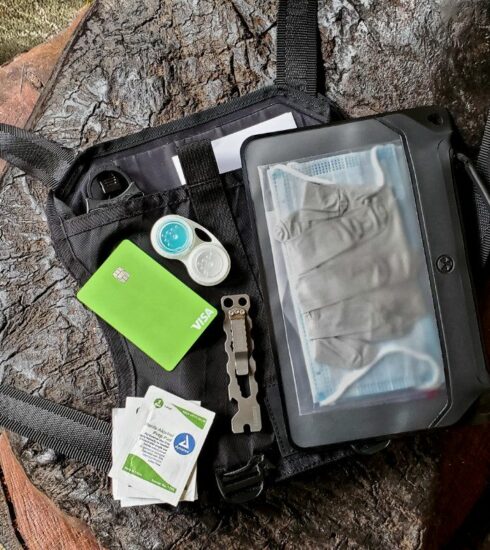12 Ways Spies Know if Their Phone is Wiretapped
The signs covert operatives recognize that their mobile phone or landline is tapped. Adapted from CIA field tradecraft and technical surveillance counter-measures (TSCM).
When you’re running operations behind enemy lines or even just working a domestic intel asset, your comms are everything. If your phone’s compromised, you’re not just at risk – you’re exposed. Whether it’s a burner cell or an old-school landline, there are subtle (and not-so-subtle) signs that someone’s listening in.
12) Odd Background Noise
Clicks, static, humming, or high-pitched tones when you’re on a call (especially if they come and go) can be telltale signs of a line tap. Sure, interference happens, but consistent or patterned noise? That’s a red flag. Wiretaps, especially older analog or poorly shielded digital ones, can introduce signal artifacts into your call. If you hear unusual sounds every time you mention certain topics or names, that’s not coincidence – that’s a trigger. Digital taps are cleaner, but even they can leave faint traces for trained ears.
PRO TIP: Make a short, fake call using trigger words or sensitive terms. If the noise level changes or the line acts strange during or after, someone might be monitoring in real time.
11) Battery Drain (Mobile)
If your phone’s battery starts dying faster than normal (even when it’s just sitting idle) that’s a classic sign of surveillance software running in the background. These programs record audio, track GPS, and sometimes even activate your mic or camera without you knowing. They stay active, especially when you’re moving, transmitting chunks of data back to whoever’s listening. It’s not just drain – it’s your phone working overtime for someone else.
PRO TIP: Turn off your phone completely, remove the battery if possible, and stash it in a Faraday bag during sensitive conversations. If that’s not an option, leave it in a separate room entirely – compromised phones can be hot mics.
10) Phone Lighting Up on Its Own
When your phone lights up with no incoming calls, messages, or alerts, that’s not just a glitch – that’s activity. It could mean someone remotely accessed the microphone, triggered the camera, or pinged the device to pull GPS data. Advanced spyware often runs silently, but some leave behind little signs like screen flickers or random activation. If it lights up while just sitting on the table and you’re not touching it? Eyes open.
PRO TIP: Leave the phone face-down on a glass surface in a quiet room. If the screen lights up or you hear faint clicking or static from the speaker, you’re not alone.
9) Echoes or Voice Delays
If you start hearing your own voice echo or there’s a delay in conversation, it could mean your call is being routed through third-party software for monitoring. Surveillance taps (especially older or poorly configured ones) often introduce latency because the audio’s being captured, processed, and then passed along. Even with modern gear, low-quality interception nodes or bandwidth constraints can create that stutter or bounce-back in your call. If you hear a half-second lag consistently, especially on secure calls, you’ve probably got a tail on your line.
PRO TIP: Call a trusted contact using a known clean line and speak simultaneously – if you’re both hearing delays, it’s likely network. If only one of you is, it’s time to swap your device or go dark.
8) Increased Data Usage
If your data usage suddenly spikes and you’re not streaming, downloading, or uploading anything big – something’s wrong. Surveillance tools transmit audio, GPS coordinates, message logs, and more, often in real time. The worst part? Most spyware disguises itself under system processes, so it won’t show up on your typical data usage breakdown. If you’re seeing gigabytes move without your say-so, you’re likely the payload, not the sender.
PRO TIP: Use a secure firewall app that tracks which processes are sending and receiving data. If something’s phoning home and it’s not tied to an app you installed, you’re already compromised.
7) Phone Won’t Power Off
Try shutting your phone off, and it freezes or won’t power down properly. A compromised device might resist shutting down because the surveillance software wants to keep running in the background. Some advanced spyware even fakes the shutdown screen, making it look like the phone’s off while it keeps the mic hot. If the screen goes black but the phone still gets warm or vibrates, you’re not holding a phone anymore – you’re holding a live bug.
PRO TIP: If you really need to be sure your phone’s off, remove the battery, if it’s a model that allows it. If not, store it in a faraday pouch when handling sensitive ops or intel. Don’t just turn it off… neutralize it.
6) Static or Clicking on Landlines
Old-school tradecraft tip: a clicking noise or volume drop when picking up or hanging up a landline often points to a physical tap. If your corded phone suddenly sounds like a bad walkie-talkie, get suspicious. Mechanical taps or inductive pickups can be installed on the line, junction box, or even inside the handset. You might also notice a faint tone or beeping when no call is active, that’s sometimes a test pulse or remote access signal used by surveillance gear.
PRO TIP: Use an analog line tester or a handheld RF detector near your landline. If it lights up or spikes while the phone’s on the hook, someone’s in your business.

5) Electronic Interference Near Speakers
You ever hear that rapid buzzing or rhythmic static near a computer speaker, car radio, or even a cheap TV? That’s usually your phone pinging a nearby cell tower or receiving a push – but if it happens when you’re not getting a call or text, it could be an indicator of covert transmissions. Surveillance gear, especially GSM-based interceptors, often emits signals that cause interference when in proximity to speakers. It’s an old-school trick, but still reliable in spotting hidden transmissions when nothing else is happening.
PRO TIP: Put your phone next to an AM radio tuned between stations – if you hear consistent pulsing noises every few minutes, especially when idle, you might be dealing with a remote access tool (RAT) phoning home.
4) Call Drops at Specific Locations
If your calls consistently drop, glitch, or cut to dead air in the same physical areas (especially urban choke points or near government buildings) you might be walking through a surveillance net. Certain mobile intercept systems (like IMSI catchers or Stingrays) are geo-fenced, meaning they’re triggered when your device enters a set zone. These systems can force your phone to connect to fake cell towers, manipulate signal strength, or even record call data on the fly.
PRO TIP: If you’re noticing this pattern, do a walk-test with multiple devices. If more than one phone behaves the same in a specific spot (especially if one’s clean) that area’s likely hot. Avoid making sensitive calls there.
3) Unusual Texts or Garbled Messages
Strange SMS messages that contain random numbers, symbols, or unreadable characters (especially if they come from unknown international numbers) could be command-and-control signals sent to spyware on your device. These messages are often invisible to the average user, but sometimes they slip through when the malware doesn’t filter them properly. Some variants of mobile surveillance tools even disguise these as blank or “ghost” texts that don’t show up in your inbox but still trigger background actions.
PRO TIP: If you ever see a pattern – like a random text showing up right before your battery drains, mic activates, or your screen lights up – that’s not a coincidence. Screenshot it, then wipe the phone. Better yet, toss it and grab a new burner.
2) Battery Temperature While Idle
If your mobile feels warm and you haven’t touched it in a while, that’s a problem. Surveillance-grade spyware doesn’t sleep – it can activate your mic, track GPS, or even stream audio to a handler without your knowledge. All that activity runs processors in the background, and processors generate heat. Even when the screen’s off, your phone could be lit up behind the scenes.
PRO TIP: Place your phone on a cool surface like glass or metal and monitor the temperature over 10–15 minutes. If it stays warm while idle, pull the battery if possible – or treat the device as burned and ditch it.
1) Delayed Voicemail Notifications
You miss a call, but your voicemail shows up an hour later, that’s not just network lag. Taps, especially those done through SS7 exploits or call-forwarding hacks, reroute the call through third-party systems before sending it back to your carrier. That delay? It’s the time it takes for the intercept to log, clone, or redirect the message to whoever’s listening.
PRO TIP: Call your own number from another line and leave a test voicemail. If the notification hits your phone instantly, you’re probably clean. If there’s a delay or no notification at all, someone might be siphoning your comms.
If you’re noticing two or more of these signs, your phone could be compromised. Tradecraft says always assume you’re being listened to, but verifying is a different story. Burners are disposable for a reason. Landlines? If you’re still using them, sweep them regularly and keep them off your operational grid.
[INTEL : Cell Phone Anti-Tracking Measures]
[OPTICS : Tapped Phone in Dubai Being Destroyed]







